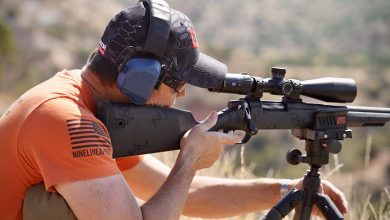Does Washington Have A Stand Your Ground Law?

It’s important to understand Washington state’s self-defense laws and their implications for gun owners.
Does Washington state have a “stand your ground” (or “no duty to retreat”) law? It does not. However, that doesn’t mean you can’t protect yourself when presented with a situation in which you feel your life is in imminent danger or you’re being threatened with bodily harm. First consider, can I remove myself from this situation?
In practice, Washington is considered a “stand your ground” despite no specific law on the books. That’s because Washington state courts have traditionally defended a person’s right to use deadly force in self-defense with no duty to retreat.
Let’s explore the self-defense laws applicable to gun owners in Washington and discuss the implications of the absence of a specific “stand your ground” law.
Washington State’s Self-Defense Laws
In the United States, self-defense laws have always been a contentious issue, particularly when it comes to gun ownership and the use of firearms in self-defense situations. Some states have adopted “stand your ground” laws, which grant individuals the right to defend themselves without what’s called a “duty to retreat.”
Washington has not passed specific legislation of this type, but the courts have consistently ruled in such a way as to make the state a de facto “stand your ground” state.
We recommend familiarizing yourself with a relevant law: RCW 9A.16.020 (“Use of force—When lawful.” The code spells out when the use of force is permitted for non-officers. For example:
- whenever used by a party about to be injured
- when “lawfully aiding” another party
- preventing an offense against his or her person
- malicious trespass
- malicious interference with real or personal property
The final line of the code — “in case the force is not more than is necessary” — refers to what’s known as proportionality. Simply put, it means the use of force must be proportional to the threat perceived, and the level of force used should not exceed what is reasonably necessary to protect oneself or others.
Implications for Gun Owners
Ordinary citizens are not usually trained in threat assessment or de-escalation techniques. It can be difficult if not impossible for an untrained person to understand the nuances of perceived threats. That’s the main reason why it’s important that courts have traditionally defended one’s right to stand your ground.
However, along with the responsibility of possessing a firearm comes the duty to be well-trained in its use. At minimum, gun owners should undergo regular firearms training to develop the skills necessary for responsible firearm handling and self-defense decision-making so that they can do so confidently and effectively if they ever have to make the split-second decision to use deadly force to protect themselves or others.
If a gun owner is involved in a self-defense incident, having access to legal counsel experienced in self-defense cases is essential. Lawyers can help navigate the complex legal landscape and ensure that the individual’s rights are protected, especially in cases where criminal charges are being determined.
As a state without a “stand your ground” law, Washington places a significant emphasis on the rights of the individual to use force to defend and protect themselves and others. This places added responsibility on gun owners to understand the law, prioritize threat assessment, and seek proper firearms training. Unlawful display of a firearm or weapon (aka brandishing) is a gross misdemeanor, therefore careful consideration should be taken before bringing a firearm in to any situation.
By doing so, gun owners can better protect themselves and their loved ones. Remember, responsible gun ownership goes beyond owning a firearm; it involves understanding and respecting the laws that govern its use.
Get in touch with Sporting Systems with any questions.







